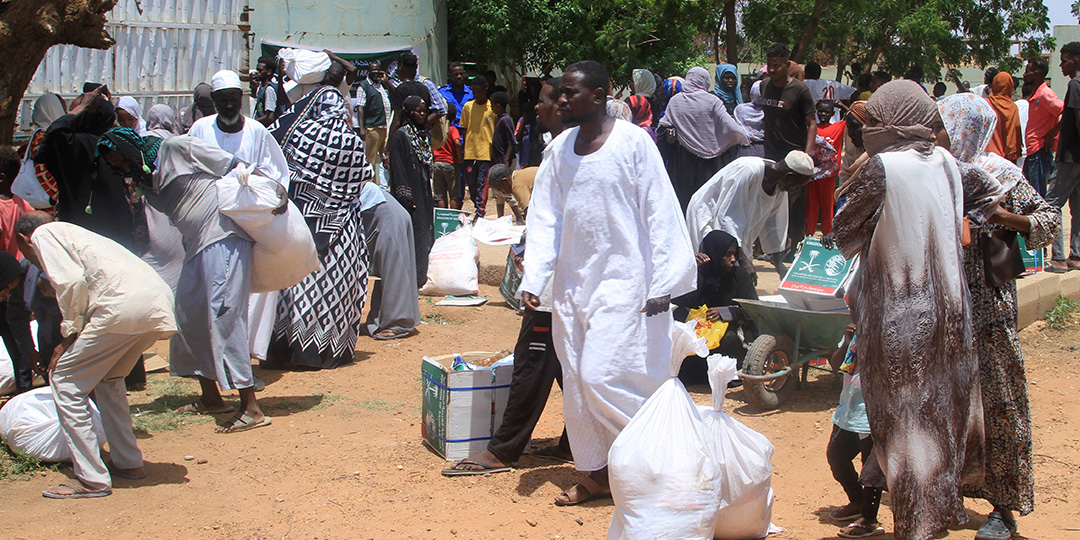Nazer Muhana Ali drank rainwater to stay alive. For four days, the 20-year-old trudged through the scrubland west of Sudan’s El-Fasher, his family at his side, beaten and robbed along the way.
“It was extremely tough because of hunger and thirst,” he said. “We had nothing but ombaz to eat.”
Ombaz, a bitter peanut husk meant for animals, was all that kept them going as they fled Sudan’s last army-held city in Darfur.
El-Fasher has been under siege since May 2024, encircled by paramilitary Rapid Support Forces (RSF). Now, the fighters have launched their deadliest assault yet, trapping 260,000 people inside.
The only escape is a 70-kilometre (43-mile) trail west to Tawila, a path littered with the bodies of those who didn’t make it.
AFP spoke to three survivors — Ali, Ahmed and Siddig — who made it out alive.
– ‘We drank from rainwater’ –
Originally from Al-Salam neighbourhood, Ali and his family had been displaced within the city and were sheltering at a school a few kilometres west in Awlad al-Reef district.
Besides hunger, Ali said, “the bombing was so intense”.
“One day, my father and brother went out for work. On their way, they were hit by an RSF drone strike. My father died instantly. My brother was taken to hospital.”
UN investigators said Friday both warring sides have shelled El-Fasher and its surrounding areas since the siege began.
The army targeted civilian areas in the east while the RSF shelled army-held neighbourhoods in the south and west, killing civilians and damaging homes, said the UN fact-finding mission for Sudan.
Left with no way to survive, Ali, his mother, his brother and three sisters began the trek west to Tawila where thousands of people have fled to escape the violence.
“RSF fighters stopped us. They beat us. They robbed us. They took everything we had,” he said.
Still, the family pressed on. “We spent four days on the road. We ate nothing but ombaz.
“We had no water. The rain came while we were walking and we drank from rainwater.”
On the fifth day, they reached the town of Tawila. “But even here, we still need shelter and food.”
– Fleeing with broken bones –
Adel Ismail Ahmed, 24, was in Abu Shouk camp, a few kilometres north of El-Fasher, when “a shell fell directly on our house”.
“My brother and I were inside. My hand was broken and it still has shrapnel in it. My brother was hit in the neck and chest.”
With fighting intensifying, Ahmed decided to flee.
“We did not have the money for treatment or food and even our wounds could not heal,” he said.
Ahmed and his brother fled at night, walking west toward the area of Golo.
“We spent two days sleeping on the road. When we reached Golo, someone dug a hole beneath a tree and we hid there the whole day.”
At dusk, they resumed their journey, heading toward Tawila.
“When we arrived, my brother and I were taken to a hospital,” said Ahmed.
“They cleaned our wounds. I’m now waiting for surgery.”
All he wants now, he said, is “medical care and a job to support our family”.
– ‘They beat us with a stick’ –
Mohamed Siddig, 28, also fled Abu Shouk after weeks of bombardment and hunger. “The pressure became too much,” he said.
“Life was so tough.”
“I left on foot but was stopped by RSF fighters.”
They accused him and four others of being with the army.
“We told them we were civilians, but they didn’t believe us. They beat us with a stick to force us to confess,” he said.
“My left hand still won’t move properly. My knee is swollen.”
After four days in captivity, he saw an opportunity. “I just ran for my life.”
But the worst, he said, wasn’t the beating.
“Hunger is the hardest part. It’s what affected us the most. We lived on ombaz.”
Siddig also described digging a makeshift hole near his house to hide from shelling.
“Usually two or three people dig a hole and hide inside. We couldn’t even cover it properly.”
Now in Tawila, he said, “things here are thousands of times better than in El-Fasher. But more people are arriving every day. We still need help.”
str-maf/dv/mjw
© Agence France-Presse








